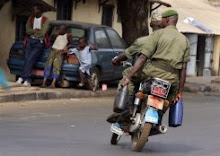Regional diplomats say reforming Guinea Bissau's security sector is crucial to stabilizing the country as it heads toward elections to replace the country's president, who was assassinated two months ago.
More than a dozen candidates are expected to contest next month's elections to succeed long-time President Joao Bernardo Vieira. He was murdered in his home in March, hours after a bomb blast killed his main political rival, army chief of staff General Batista Tagme Na Waie.
In hopes of breaking a history of army mutinies and coups, the International Contact Group on Guinea Bissau is calling for wide-spread reforms to the nation's defense and security sectors.
Representatives from 28 nations met in Cape Verde to discuss those changes. The group includes the Economic Community of West African States, the United Nations, and the Community of Portuguese-Speaking Countries, along with members of the government in Bissau.
The Contact Group is calling for the establishment of military pension funds to encourage those who have reached retirement age to leave the army.
It wants the rehabilitation of military barracks and a census of security forces to better understand just how many people are under arms in Guinea Bissau. That will allow the new government to both demobilize current soldiers and recruit new cadets to better reflect the country's ethnic balance in an army long dominated by the majority Balanta.
Professor Fafali Kudawo says security sector reform is crucial in a country that he says is both overly dependent on the external community and careless about the welfare of its own people.
"This very weak state has to be reformed. To reform the state, you have to see the civil service, and then principally the defense and security sector. This is the key because the defense sector is seen as the main obstacle to stability in this country," he said.
Kudawo says that is because most of the armed forces fought against Portuguese colonialism.
"Every veteran of the liberation struggle considers himself as an owner of a part of this country. And the historical legitimacy drawn from that independence war is considered superior to a political legitimacy gained through a ballot," Kudawo said.
The Contact Group is calling for the creation of an academy to train civil security forces in the protection of democratic institutions and the people who run them. The threat of political violence and the proliferation of small arms in Guinea Bissau is of particular concern in the run-up to June's election.
"With what we are going to go through, especially the upcoming elections, it is certain that small-arms issue is going to resurface," said Takwa Zebulone Sulfon, program director for the West Africa Network for Peace Building and monitors the flow of small arms through Guinea Bissau.
"When people prepare to go for elections, and they fear that somebody can point a gun on their head if you do not do this or that, the process itself risks being undermined," said Zebulone.
Guinea Bissau has become a major transit point for South American drugs headed to Europe. To confront that threat, the Contact Group wants stronger internal controls to block military complicity in drug trafficking. It is calling for a broader regional approach to stopping illegal drugs and international support to ensure the prompt payment of security agents' salaries.
Sulfon says there is a strong correlation between security sector reform, organized crime, and drug smugglers who traffic in small arms as part of the larger underground market.
"When a system is collapsing or when you are building out of years of war, there is a tendency for people to always have hidden agendas which you can not understand, and also the tendency for the drug barons who have been invading West Africa from Latin America to take advantage of the failing systems to reposition themselves," he said.
He says international and regional involvement in defense and security sector reforms in Guinea Bissau should not be about placing blame for past violence.
"How do we work together with Guinea Bissau in a more comprehensive manner to deal with the governance issues? The issues of sustainability of the population itself," he said. "It is from there that people will try to say, 'Look, I do not need an arm. I need more of an education. I need more of a sustainable job. I need more of how to work and transform my country. And arms will not solve anybody's problems.'"
The Contact Group is calling for reforms in Guinea Bissau's justice sector to support changes in defense and security. It is recommending a stronger attorney general, the rehabilitation of existing courts and tribunals, and the construction of new prisons.
Sulfon says past promises of funding to support such changes have not been met.
"These promises are not backed by concrete action on the ground. And we are very, very worried that if we are to work from a preventive prospective, we must do more in Guinea Bissau. And the time is now," said Sulfon.
Without security sector reform, Sulfon says instability in Guinea Bissau could spread to neighboring Guinea Conakry, where soldiers took power in a coup last December, and to neighboring Senegal, where there is a long-simmering insurgency in the southern Casamance region.
By Scott Stearns
Source: VOA

No comments:
Post a Comment